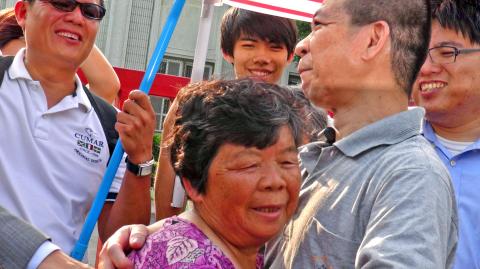The Taichung Branch of the Taiwan High Court yesterday ruled that death-row inmate Cheng Hsing-tse (鄭性澤) should be released on bail pending a retrial on the charges that have seen him imprisoned for 14 years, including 10 on death row.
The 49-year-old Cheng, who has always maintained his innocence, walked out of the Taichung Prison in the afternoon and was met by family members and supporters, including representatives of the Taiwan Association for Innocence and the Taiwan Alliance to End the Death Penalty.
After 5,231 days of incarceration, Cheng said: “This taste of freedom is a really great feeling.”

Photo: Hsu Kuo-chen, Taipei Times
“I have been imprisoned for the past 14 years, but now I am so happy that I can spend this Mother’s Day with my family,” he said as he embraced his mother.
Some supporters came with sunflowers and handed one to Cheng, as they hailed his release as a victory for human rights and shouted: “Cheng is innocent of the crime” and “We don’t want to have any more wrongful convictions.”
Cheng’s attorney Law Bing-cheng (羅秉成) said the day has been late in coming because his client is innocent and has been jailed for too long.
“Today he is set free, and for this we have to thank the prosecutors and the judges. This case has also set milestones in Taiwan’s judiciary, because it is the first time that a man whose death sentence was upheld by the Supreme Court is going to receive a retrial. I am certain Cheng has the courage to face the retrial so that he can clear his name,” Law said.
Yesterday’s decision barred Cheng from leaving the country or going out to sea.
Cheng’s case has gone through seven trials and seven retrials, including the Supreme Court upholding his death sentence in 2006.
A retrial was ordered after Cheng’s defense team presented new evidence raising doubts about his conviction for the death of police officer Su Hsien-pi (蘇憲丕) during an exchange of gunfire at a KTV parlor in Taichung in 2002 and prosecutors concurred.
The prosecutors’ application in March for a retrial was the first time in the nation’s history that a retrial has been sought in a case where the Supreme Court’s final ruling upheld the original death sentence.
Cheng is the fifth death row inmate to be released from prison for a retrial, including the Hsichih Trio case of Su Chien-ho (蘇建和), Liu Bin-lang (劉秉郎) and Chuang Lin-hsun (莊林勳), who were found not guilty in 2012.
Human rights groups have long highlighted what they said were defects in the original investigation and questionable evidence used by prosecutors, including a confession that Cheng had been tortured and coerced into making.
After re-examining the forensic evidence and findings from a new investigative report, Taichung prosecutor Wu Tsui-fang (吳萃芳) decided a retrial was needed because the evidence indicated that another suspect had fired the fatal gunshot that killed Su, not Cheng.

Intelligence agents have recorded 510,000 instances of “controversial information” being spread online by the Chinese Communist Party (CCP) so far this year, the National Security Bureau (NSB) said in a report yesterday, as it warned of artificial intelligence (AI) being employed to generate destabilizing misinformation. The bureau submitted a written report to the Legislative Yuan in preparation for National Security Bureau Director-General Tsai Ming-yen’s (蔡明彥) appearance before the Foreign Affairs and National Defense Committee today. The CCP has been using cognitive warfare to divide Taiwanese society by commenting on controversial issues such as Taiwan Semiconductor Manufacturing Co’s (TSMC, 台積電) investments in the

INVESTIGATION: The case is the latest instance of a DPP figure being implicated in an espionage network accused of allegedly leaking information to Chinese intelligence Democratic Progressive Party (DPP) member Ho Jen-chieh (何仁傑) was detained and held incommunicado yesterday on suspicion of spying for China during his tenure as assistant to then-minister of foreign affairs Joseph Wu (吳釗燮). The Taipei District Prosecutors’ Office said Ho was implicated during its investigation into alleged spying activities by former Presidential Office consultant Wu Shang-yu (吳尚雨). Prosecutors said there is reason to believe Ho breached the National Security Act (國家安全法) by leaking classified Ministry of Foreign Affairs information to Chinese intelligence. Following interrogation, prosecutors petitioned the Taipei District Court to detain Ho, citing concerns over potential collusion or tampering of evidence. The

‘COMPREHENSIVE PLAN’: Lin Chia-lung said that the government was ready to talk about a variety of issues, including investment in and purchases from the US The National Stabilization Fund (NSF) yesterday announced that it would step in to staunch stock market losses for the ninth time in the nation’s history. An NSF board meeting, originally scheduled for Monday next week, was moved to yesterday after stocks plummeted in the wake of US President Donald Trump’s announcement of 32 percent tariffs on Taiwan on Wednesday last week. Board members voted to support the stock market with the NT$500 billion (US$15.15 billion) fund, with injections of funds to begin as soon as today. The NSF in 2000 injected NT$120 billion to stabilize stocks, the most ever. The lowest amount it

NEGOTIATIONS: Taiwan has good relations with Washington and the outlook for the negotiations looks promising, Minister of Economic Affairs J.W. Kuo said Taiwan’s GDP growth this year is expected to decrease by 0.43 to 1.61 percentage points due to the effects of US tariffs, National Development Council (NDC) Minister Paul Liu (劉鏡清) said at a meeting of the legislature’s Economics Committee in Taipei yesterday, citing a preliminary estimate by a private research institution. Taiwan’s economy would be significantly affected by the 32 percent “reciprocal” tariffs slapped by the US, which took effect yesterday, Liu said, adding that GDP growth could fall below 3 percent and potentially even dip below 2 percent to 1.53 percent this year. The council has commissioned another institution